Management Practices: Operations, Motivation, and Communication
VerifiedAdded on 2023/06/15
|13
|4086
|86
Report
AI Summary
This report assesses the contribution and functions of an operational manager in the growth and development of an organization, using Tesco as a case study. It demonstrates the importance of operations management in achieving organizational aims and objectives. The report analyzes management approaches, such as scientific management and systems approach, that the organization can implement to execute management functions effectively, define organizational structure, and improve performance. Additionally, it discusses the significance of motivation in the workplace and various techniques to enhance employee productivity and efficiency. The report also highlights the role of effective communication and teamwork in supporting business performance, emphasizing the importance of a healthy employer-employee relationship.
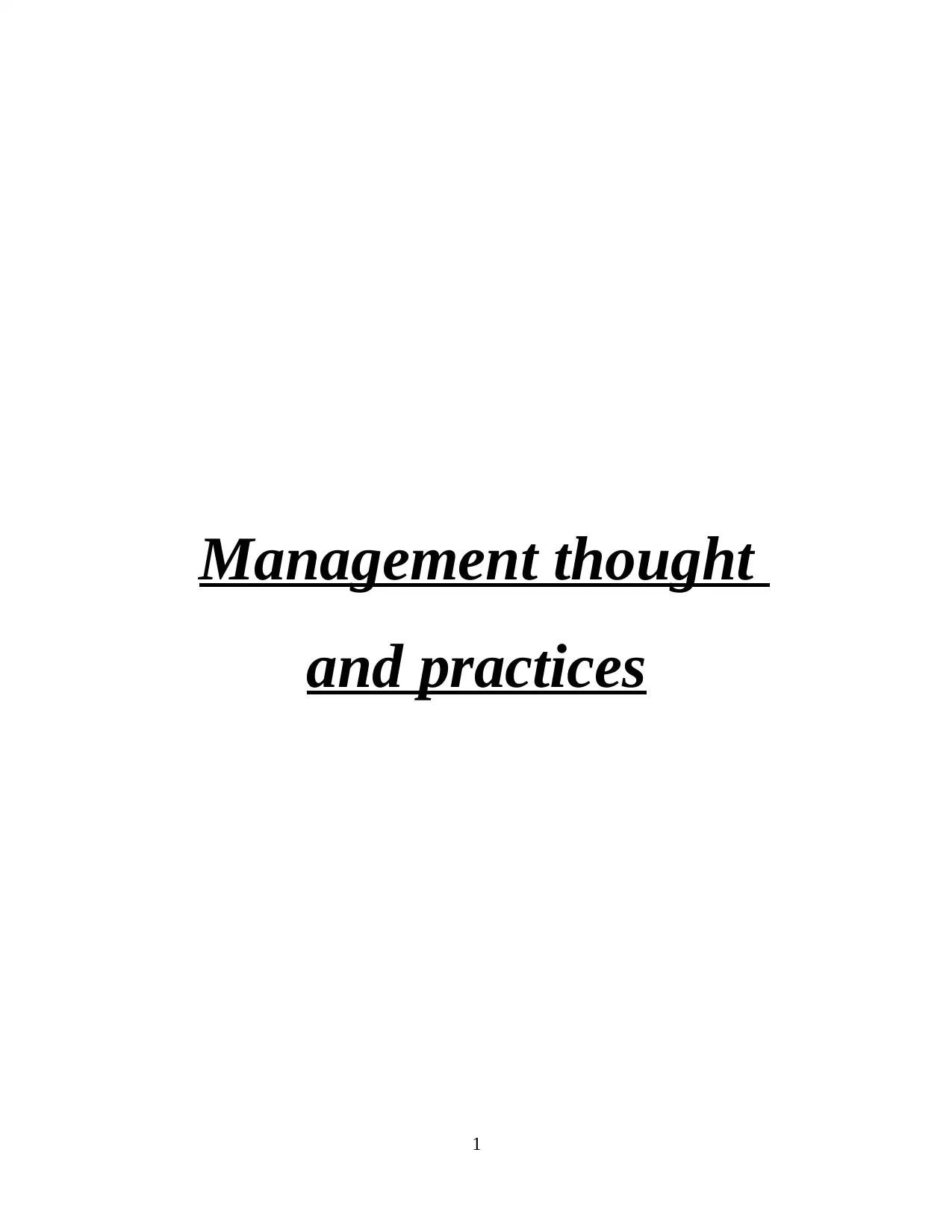
Management thought
and practices
1
and practices
1
Paraphrase This Document
Need a fresh take? Get an instant paraphrase of this document with our AI Paraphraser
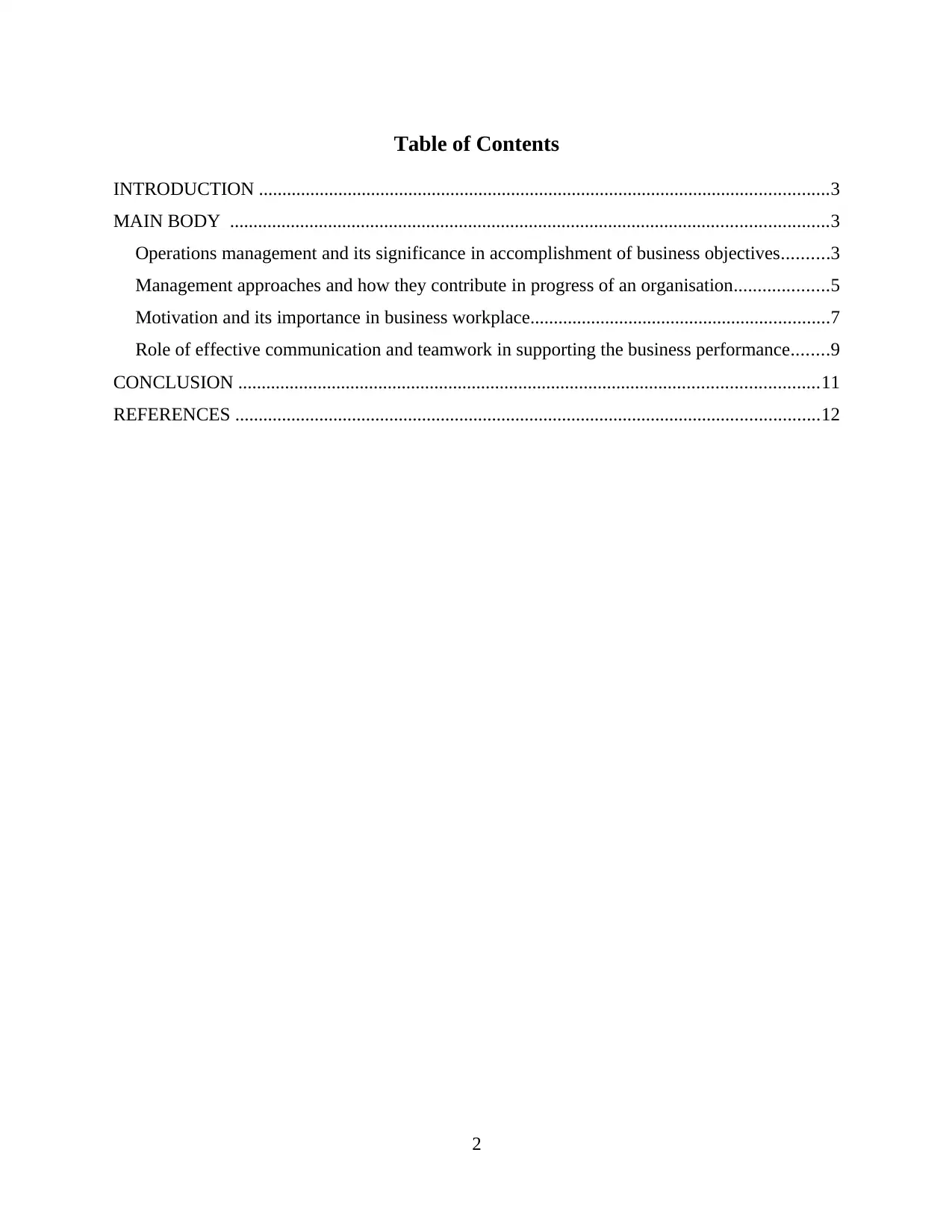
Table of Contents
INTRODUCTION ..........................................................................................................................3
MAIN BODY ................................................................................................................................3
Operations management and its significance in accomplishment of business objectives..........3
Management approaches and how they contribute in progress of an organisation....................5
Motivation and its importance in business workplace................................................................7
Role of effective communication and teamwork in supporting the business performance........9
CONCLUSION ............................................................................................................................11
REFERENCES .............................................................................................................................12
2
INTRODUCTION ..........................................................................................................................3
MAIN BODY ................................................................................................................................3
Operations management and its significance in accomplishment of business objectives..........3
Management approaches and how they contribute in progress of an organisation....................5
Motivation and its importance in business workplace................................................................7
Role of effective communication and teamwork in supporting the business performance........9
CONCLUSION ............................................................................................................................11
REFERENCES .............................................................................................................................12
2
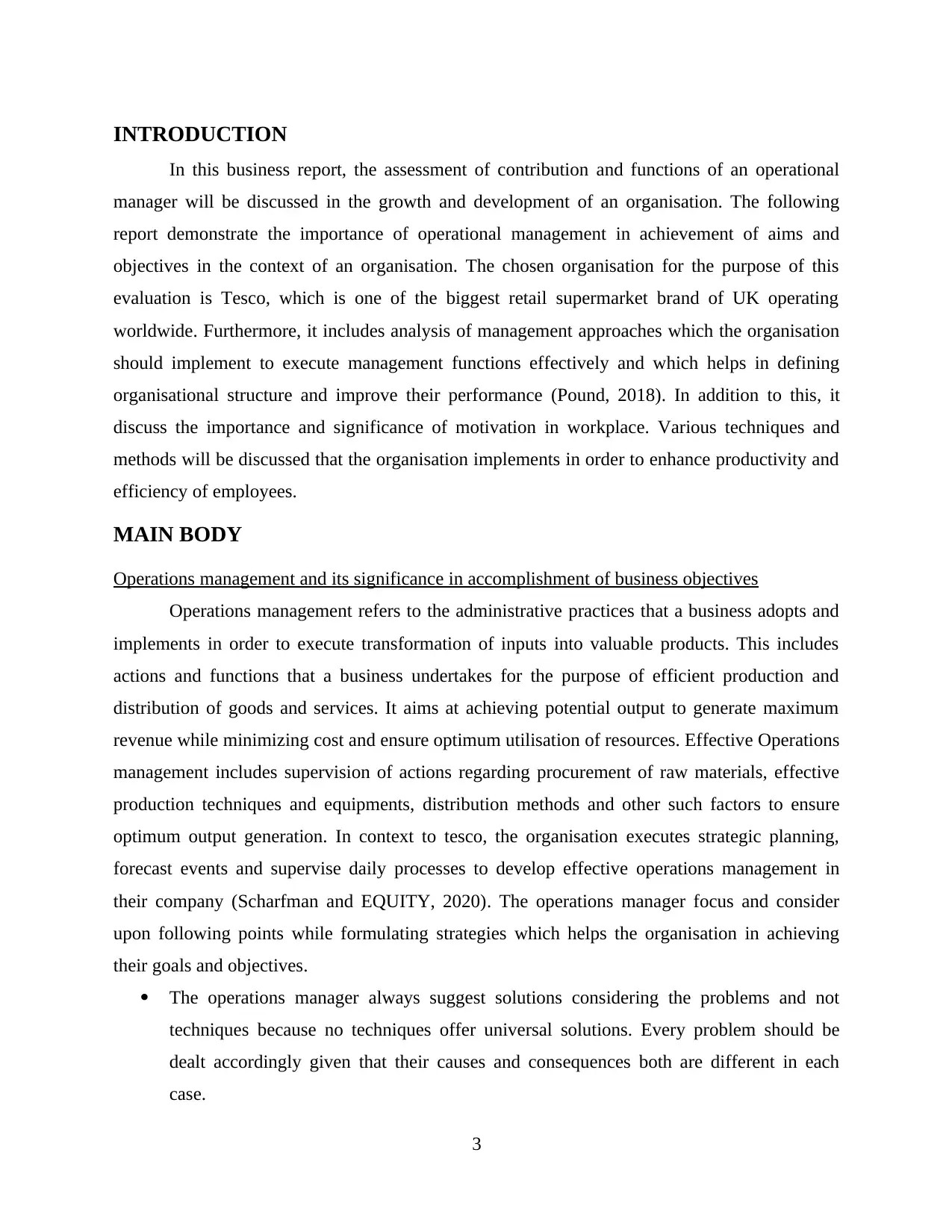
INTRODUCTION
In this business report, the assessment of contribution and functions of an operational
manager will be discussed in the growth and development of an organisation. The following
report demonstrate the importance of operational management in achievement of aims and
objectives in the context of an organisation. The chosen organisation for the purpose of this
evaluation is Tesco, which is one of the biggest retail supermarket brand of UK operating
worldwide. Furthermore, it includes analysis of management approaches which the organisation
should implement to execute management functions effectively and which helps in defining
organisational structure and improve their performance (Pound, 2018). In addition to this, it
discuss the importance and significance of motivation in workplace. Various techniques and
methods will be discussed that the organisation implements in order to enhance productivity and
efficiency of employees.
MAIN BODY
Operations management and its significance in accomplishment of business objectives
Operations management refers to the administrative practices that a business adopts and
implements in order to execute transformation of inputs into valuable products. This includes
actions and functions that a business undertakes for the purpose of efficient production and
distribution of goods and services. It aims at achieving potential output to generate maximum
revenue while minimizing cost and ensure optimum utilisation of resources. Effective Operations
management includes supervision of actions regarding procurement of raw materials, effective
production techniques and equipments, distribution methods and other such factors to ensure
optimum output generation. In context to tesco, the organisation executes strategic planning,
forecast events and supervise daily processes to develop effective operations management in
their company (Scharfman and EQUITY, 2020). The operations manager focus and consider
upon following points while formulating strategies which helps the organisation in achieving
their goals and objectives.
The operations manager always suggest solutions considering the problems and not
techniques because no techniques offer universal solutions. Every problem should be
dealt accordingly given that their causes and consequences both are different in each
case.
3
In this business report, the assessment of contribution and functions of an operational
manager will be discussed in the growth and development of an organisation. The following
report demonstrate the importance of operational management in achievement of aims and
objectives in the context of an organisation. The chosen organisation for the purpose of this
evaluation is Tesco, which is one of the biggest retail supermarket brand of UK operating
worldwide. Furthermore, it includes analysis of management approaches which the organisation
should implement to execute management functions effectively and which helps in defining
organisational structure and improve their performance (Pound, 2018). In addition to this, it
discuss the importance and significance of motivation in workplace. Various techniques and
methods will be discussed that the organisation implements in order to enhance productivity and
efficiency of employees.
MAIN BODY
Operations management and its significance in accomplishment of business objectives
Operations management refers to the administrative practices that a business adopts and
implements in order to execute transformation of inputs into valuable products. This includes
actions and functions that a business undertakes for the purpose of efficient production and
distribution of goods and services. It aims at achieving potential output to generate maximum
revenue while minimizing cost and ensure optimum utilisation of resources. Effective Operations
management includes supervision of actions regarding procurement of raw materials, effective
production techniques and equipments, distribution methods and other such factors to ensure
optimum output generation. In context to tesco, the organisation executes strategic planning,
forecast events and supervise daily processes to develop effective operations management in
their company (Scharfman and EQUITY, 2020). The operations manager focus and consider
upon following points while formulating strategies which helps the organisation in achieving
their goals and objectives.
The operations manager always suggest solutions considering the problems and not
techniques because no techniques offer universal solutions. Every problem should be
dealt accordingly given that their causes and consequences both are different in each
case.
3
⊘ This is a preview!⊘
Do you want full access?
Subscribe today to unlock all pages.

Trusted by 1+ million students worldwide
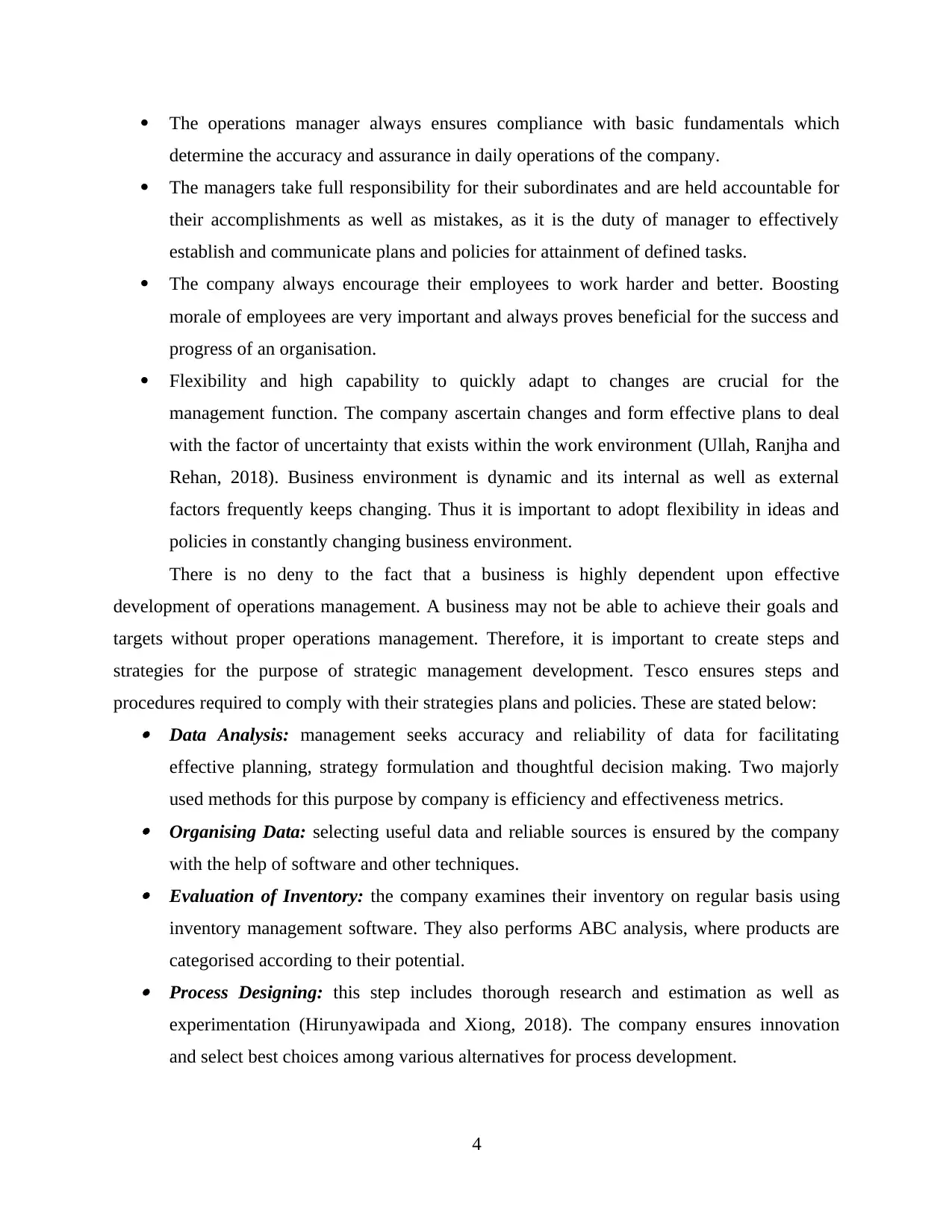
The operations manager always ensures compliance with basic fundamentals which
determine the accuracy and assurance in daily operations of the company.
The managers take full responsibility for their subordinates and are held accountable for
their accomplishments as well as mistakes, as it is the duty of manager to effectively
establish and communicate plans and policies for attainment of defined tasks.
The company always encourage their employees to work harder and better. Boosting
morale of employees are very important and always proves beneficial for the success and
progress of an organisation.
Flexibility and high capability to quickly adapt to changes are crucial for the
management function. The company ascertain changes and form effective plans to deal
with the factor of uncertainty that exists within the work environment (Ullah, Ranjha and
Rehan, 2018). Business environment is dynamic and its internal as well as external
factors frequently keeps changing. Thus it is important to adopt flexibility in ideas and
policies in constantly changing business environment.
There is no deny to the fact that a business is highly dependent upon effective
development of operations management. A business may not be able to achieve their goals and
targets without proper operations management. Therefore, it is important to create steps and
strategies for the purpose of strategic management development. Tesco ensures steps and
procedures required to comply with their strategies plans and policies. These are stated below: Data Analysis: management seeks accuracy and reliability of data for facilitating
effective planning, strategy formulation and thoughtful decision making. Two majorly
used methods for this purpose by company is efficiency and effectiveness metrics. Organising Data: selecting useful data and reliable sources is ensured by the company
with the help of software and other techniques. Evaluation of Inventory: the company examines their inventory on regular basis using
inventory management software. They also performs ABC analysis, where products are
categorised according to their potential. Process Designing: this step includes thorough research and estimation as well as
experimentation (Hirunyawipada and Xiong, 2018). The company ensures innovation
and select best choices among various alternatives for process development.
4
determine the accuracy and assurance in daily operations of the company.
The managers take full responsibility for their subordinates and are held accountable for
their accomplishments as well as mistakes, as it is the duty of manager to effectively
establish and communicate plans and policies for attainment of defined tasks.
The company always encourage their employees to work harder and better. Boosting
morale of employees are very important and always proves beneficial for the success and
progress of an organisation.
Flexibility and high capability to quickly adapt to changes are crucial for the
management function. The company ascertain changes and form effective plans to deal
with the factor of uncertainty that exists within the work environment (Ullah, Ranjha and
Rehan, 2018). Business environment is dynamic and its internal as well as external
factors frequently keeps changing. Thus it is important to adopt flexibility in ideas and
policies in constantly changing business environment.
There is no deny to the fact that a business is highly dependent upon effective
development of operations management. A business may not be able to achieve their goals and
targets without proper operations management. Therefore, it is important to create steps and
strategies for the purpose of strategic management development. Tesco ensures steps and
procedures required to comply with their strategies plans and policies. These are stated below: Data Analysis: management seeks accuracy and reliability of data for facilitating
effective planning, strategy formulation and thoughtful decision making. Two majorly
used methods for this purpose by company is efficiency and effectiveness metrics. Organising Data: selecting useful data and reliable sources is ensured by the company
with the help of software and other techniques. Evaluation of Inventory: the company examines their inventory on regular basis using
inventory management software. They also performs ABC analysis, where products are
categorised according to their potential. Process Designing: this step includes thorough research and estimation as well as
experimentation (Hirunyawipada and Xiong, 2018). The company ensures innovation
and select best choices among various alternatives for process development.
4
Paraphrase This Document
Need a fresh take? Get an instant paraphrase of this document with our AI Paraphraser
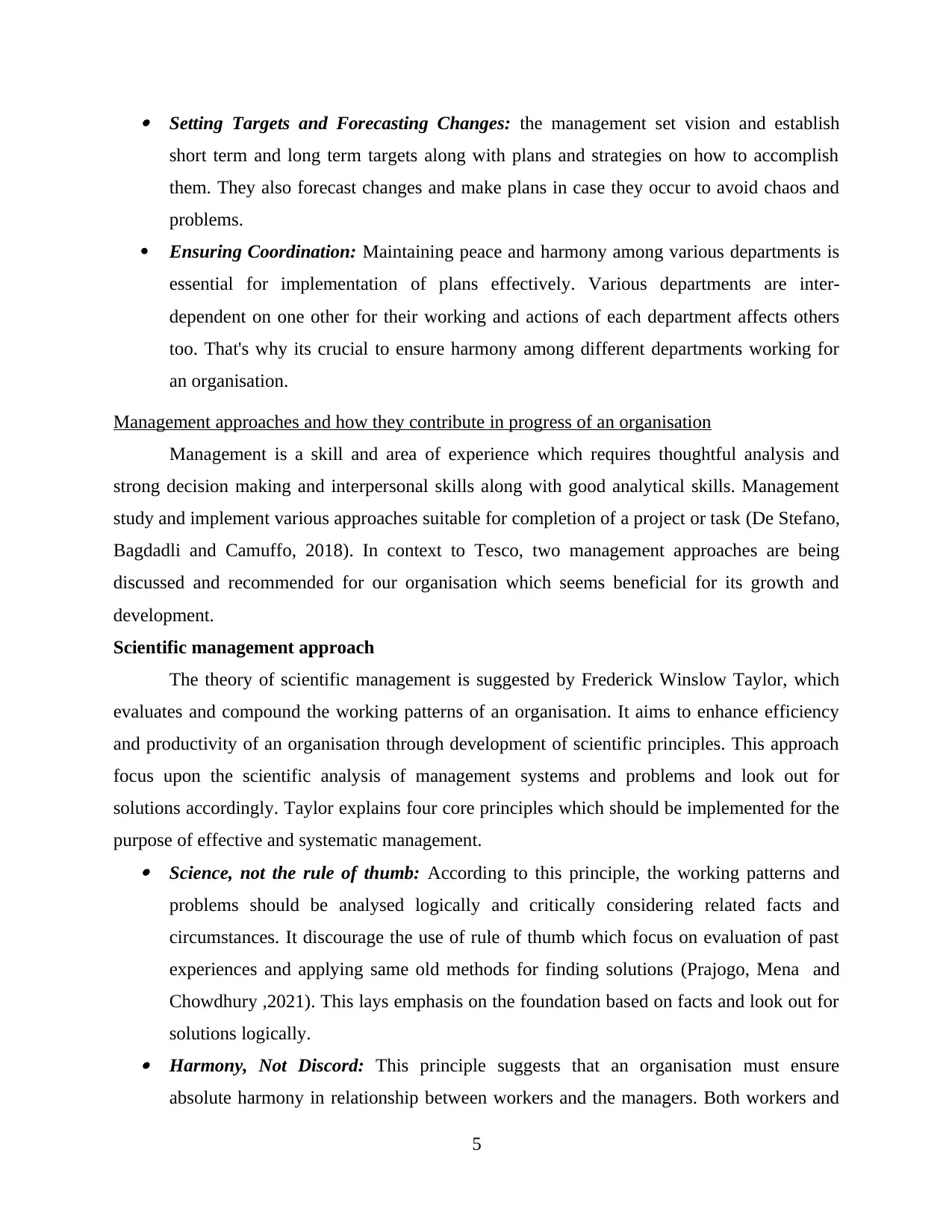
Setting Targets and Forecasting Changes: the management set vision and establish
short term and long term targets along with plans and strategies on how to accomplish
them. They also forecast changes and make plans in case they occur to avoid chaos and
problems.
Ensuring Coordination: Maintaining peace and harmony among various departments is
essential for implementation of plans effectively. Various departments are inter-
dependent on one other for their working and actions of each department affects others
too. That's why its crucial to ensure harmony among different departments working for
an organisation.
Management approaches and how they contribute in progress of an organisation
Management is a skill and area of experience which requires thoughtful analysis and
strong decision making and interpersonal skills along with good analytical skills. Management
study and implement various approaches suitable for completion of a project or task (De Stefano,
Bagdadli and Camuffo, 2018). In context to Tesco, two management approaches are being
discussed and recommended for our organisation which seems beneficial for its growth and
development.
Scientific management approach
The theory of scientific management is suggested by Frederick Winslow Taylor, which
evaluates and compound the working patterns of an organisation. It aims to enhance efficiency
and productivity of an organisation through development of scientific principles. This approach
focus upon the scientific analysis of management systems and problems and look out for
solutions accordingly. Taylor explains four core principles which should be implemented for the
purpose of effective and systematic management. Science, not the rule of thumb: According to this principle, the working patterns and
problems should be analysed logically and critically considering related facts and
circumstances. It discourage the use of rule of thumb which focus on evaluation of past
experiences and applying same old methods for finding solutions (Prajogo, Mena and
Chowdhury ,2021). This lays emphasis on the foundation based on facts and look out for
solutions logically. Harmony, Not Discord: This principle suggests that an organisation must ensure
absolute harmony in relationship between workers and the managers. Both workers and
5
short term and long term targets along with plans and strategies on how to accomplish
them. They also forecast changes and make plans in case they occur to avoid chaos and
problems.
Ensuring Coordination: Maintaining peace and harmony among various departments is
essential for implementation of plans effectively. Various departments are inter-
dependent on one other for their working and actions of each department affects others
too. That's why its crucial to ensure harmony among different departments working for
an organisation.
Management approaches and how they contribute in progress of an organisation
Management is a skill and area of experience which requires thoughtful analysis and
strong decision making and interpersonal skills along with good analytical skills. Management
study and implement various approaches suitable for completion of a project or task (De Stefano,
Bagdadli and Camuffo, 2018). In context to Tesco, two management approaches are being
discussed and recommended for our organisation which seems beneficial for its growth and
development.
Scientific management approach
The theory of scientific management is suggested by Frederick Winslow Taylor, which
evaluates and compound the working patterns of an organisation. It aims to enhance efficiency
and productivity of an organisation through development of scientific principles. This approach
focus upon the scientific analysis of management systems and problems and look out for
solutions accordingly. Taylor explains four core principles which should be implemented for the
purpose of effective and systematic management. Science, not the rule of thumb: According to this principle, the working patterns and
problems should be analysed logically and critically considering related facts and
circumstances. It discourage the use of rule of thumb which focus on evaluation of past
experiences and applying same old methods for finding solutions (Prajogo, Mena and
Chowdhury ,2021). This lays emphasis on the foundation based on facts and look out for
solutions logically. Harmony, Not Discord: This principle suggests that an organisation must ensure
absolute harmony in relationship between workers and the managers. Both workers and
5
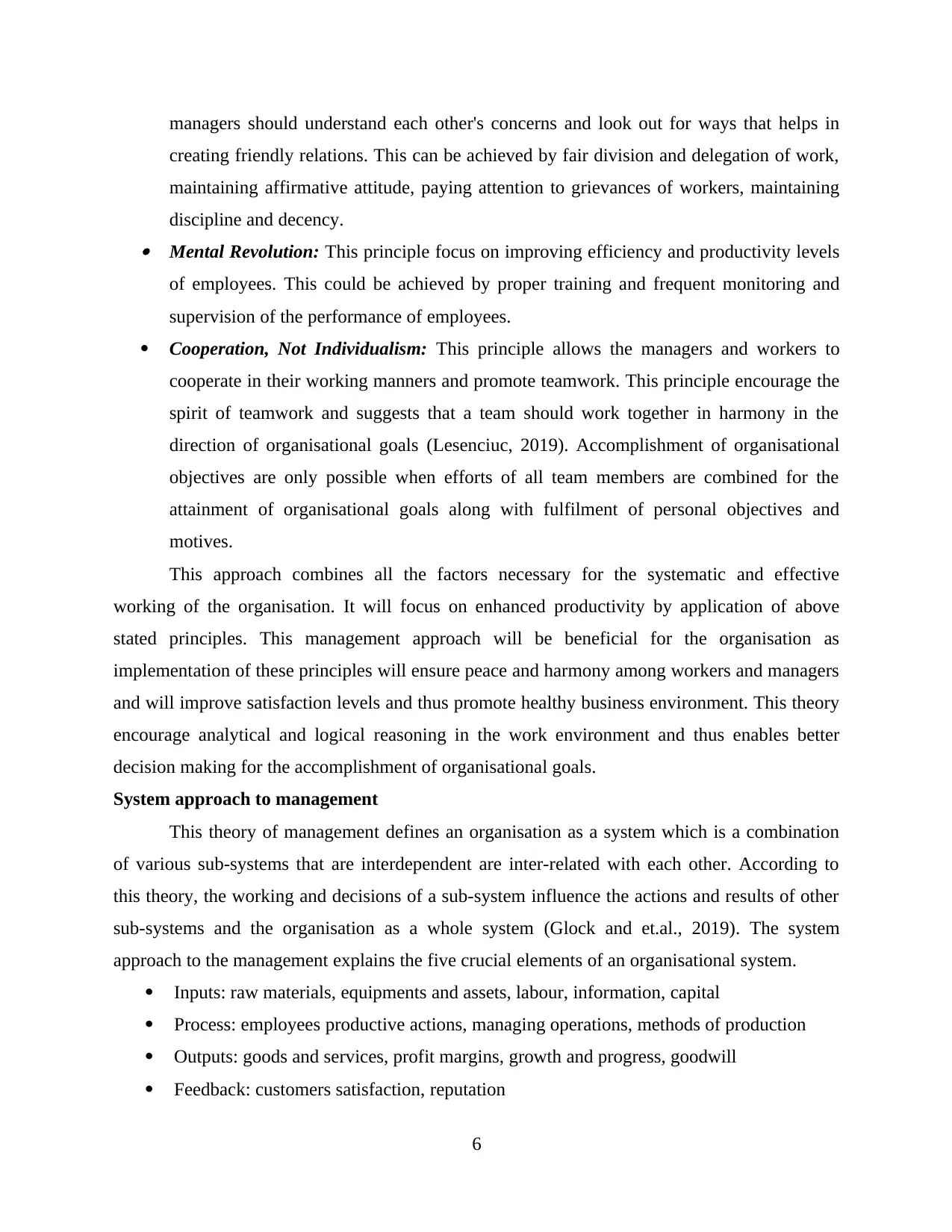
managers should understand each other's concerns and look out for ways that helps in
creating friendly relations. This can be achieved by fair division and delegation of work,
maintaining affirmative attitude, paying attention to grievances of workers, maintaining
discipline and decency. Mental Revolution: This principle focus on improving efficiency and productivity levels
of employees. This could be achieved by proper training and frequent monitoring and
supervision of the performance of employees.
Cooperation, Not Individualism: This principle allows the managers and workers to
cooperate in their working manners and promote teamwork. This principle encourage the
spirit of teamwork and suggests that a team should work together in harmony in the
direction of organisational goals (Lesenciuc, 2019). Accomplishment of organisational
objectives are only possible when efforts of all team members are combined for the
attainment of organisational goals along with fulfilment of personal objectives and
motives.
This approach combines all the factors necessary for the systematic and effective
working of the organisation. It will focus on enhanced productivity by application of above
stated principles. This management approach will be beneficial for the organisation as
implementation of these principles will ensure peace and harmony among workers and managers
and will improve satisfaction levels and thus promote healthy business environment. This theory
encourage analytical and logical reasoning in the work environment and thus enables better
decision making for the accomplishment of organisational goals.
System approach to management
This theory of management defines an organisation as a system which is a combination
of various sub-systems that are interdependent are inter-related with each other. According to
this theory, the working and decisions of a sub-system influence the actions and results of other
sub-systems and the organisation as a whole system (Glock and et.al., 2019). The system
approach to the management explains the five crucial elements of an organisational system.
Inputs: raw materials, equipments and assets, labour, information, capital
Process: employees productive actions, managing operations, methods of production
Outputs: goods and services, profit margins, growth and progress, goodwill
Feedback: customers satisfaction, reputation
6
creating friendly relations. This can be achieved by fair division and delegation of work,
maintaining affirmative attitude, paying attention to grievances of workers, maintaining
discipline and decency. Mental Revolution: This principle focus on improving efficiency and productivity levels
of employees. This could be achieved by proper training and frequent monitoring and
supervision of the performance of employees.
Cooperation, Not Individualism: This principle allows the managers and workers to
cooperate in their working manners and promote teamwork. This principle encourage the
spirit of teamwork and suggests that a team should work together in harmony in the
direction of organisational goals (Lesenciuc, 2019). Accomplishment of organisational
objectives are only possible when efforts of all team members are combined for the
attainment of organisational goals along with fulfilment of personal objectives and
motives.
This approach combines all the factors necessary for the systematic and effective
working of the organisation. It will focus on enhanced productivity by application of above
stated principles. This management approach will be beneficial for the organisation as
implementation of these principles will ensure peace and harmony among workers and managers
and will improve satisfaction levels and thus promote healthy business environment. This theory
encourage analytical and logical reasoning in the work environment and thus enables better
decision making for the accomplishment of organisational goals.
System approach to management
This theory of management defines an organisation as a system which is a combination
of various sub-systems that are interdependent are inter-related with each other. According to
this theory, the working and decisions of a sub-system influence the actions and results of other
sub-systems and the organisation as a whole system (Glock and et.al., 2019). The system
approach to the management explains the five crucial elements of an organisational system.
Inputs: raw materials, equipments and assets, labour, information, capital
Process: employees productive actions, managing operations, methods of production
Outputs: goods and services, profit margins, growth and progress, goodwill
Feedback: customers satisfaction, reputation
6
⊘ This is a preview!⊘
Do you want full access?
Subscribe today to unlock all pages.

Trusted by 1+ million students worldwide
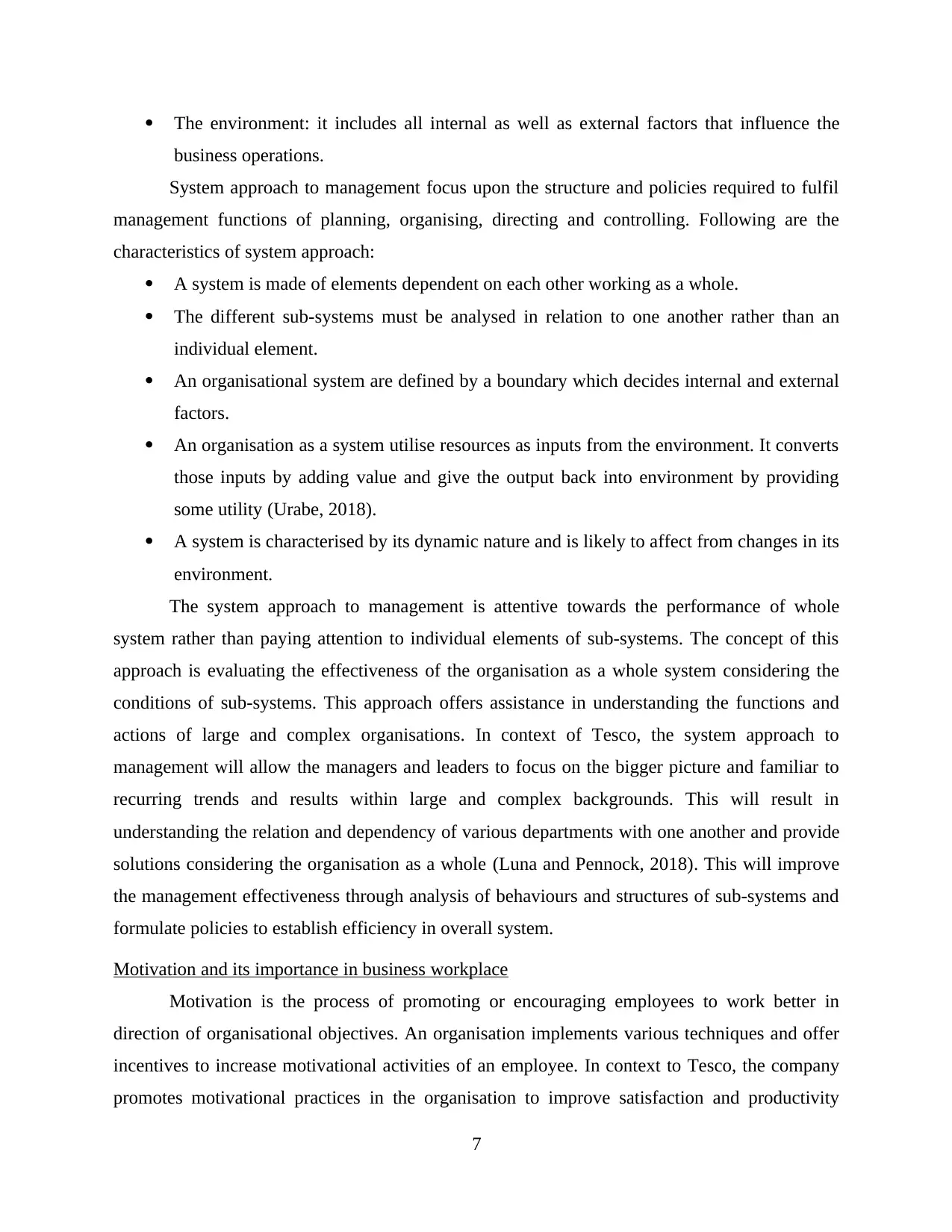
The environment: it includes all internal as well as external factors that influence the
business operations.
System approach to management focus upon the structure and policies required to fulfil
management functions of planning, organising, directing and controlling. Following are the
characteristics of system approach:
A system is made of elements dependent on each other working as a whole.
The different sub-systems must be analysed in relation to one another rather than an
individual element.
An organisational system are defined by a boundary which decides internal and external
factors.
An organisation as a system utilise resources as inputs from the environment. It converts
those inputs by adding value and give the output back into environment by providing
some utility (Urabe, 2018).
A system is characterised by its dynamic nature and is likely to affect from changes in its
environment.
The system approach to management is attentive towards the performance of whole
system rather than paying attention to individual elements of sub-systems. The concept of this
approach is evaluating the effectiveness of the organisation as a whole system considering the
conditions of sub-systems. This approach offers assistance in understanding the functions and
actions of large and complex organisations. In context of Tesco, the system approach to
management will allow the managers and leaders to focus on the bigger picture and familiar to
recurring trends and results within large and complex backgrounds. This will result in
understanding the relation and dependency of various departments with one another and provide
solutions considering the organisation as a whole (Luna and Pennock, 2018). This will improve
the management effectiveness through analysis of behaviours and structures of sub-systems and
formulate policies to establish efficiency in overall system.
Motivation and its importance in business workplace
Motivation is the process of promoting or encouraging employees to work better in
direction of organisational objectives. An organisation implements various techniques and offer
incentives to increase motivational activities of an employee. In context to Tesco, the company
promotes motivational practices in the organisation to improve satisfaction and productivity
7
business operations.
System approach to management focus upon the structure and policies required to fulfil
management functions of planning, organising, directing and controlling. Following are the
characteristics of system approach:
A system is made of elements dependent on each other working as a whole.
The different sub-systems must be analysed in relation to one another rather than an
individual element.
An organisational system are defined by a boundary which decides internal and external
factors.
An organisation as a system utilise resources as inputs from the environment. It converts
those inputs by adding value and give the output back into environment by providing
some utility (Urabe, 2018).
A system is characterised by its dynamic nature and is likely to affect from changes in its
environment.
The system approach to management is attentive towards the performance of whole
system rather than paying attention to individual elements of sub-systems. The concept of this
approach is evaluating the effectiveness of the organisation as a whole system considering the
conditions of sub-systems. This approach offers assistance in understanding the functions and
actions of large and complex organisations. In context of Tesco, the system approach to
management will allow the managers and leaders to focus on the bigger picture and familiar to
recurring trends and results within large and complex backgrounds. This will result in
understanding the relation and dependency of various departments with one another and provide
solutions considering the organisation as a whole (Luna and Pennock, 2018). This will improve
the management effectiveness through analysis of behaviours and structures of sub-systems and
formulate policies to establish efficiency in overall system.
Motivation and its importance in business workplace
Motivation is the process of promoting or encouraging employees to work better in
direction of organisational objectives. An organisation implements various techniques and offer
incentives to increase motivational activities of an employee. In context to Tesco, the company
promotes motivational practices in the organisation to improve satisfaction and productivity
7
Paraphrase This Document
Need a fresh take? Get an instant paraphrase of this document with our AI Paraphraser
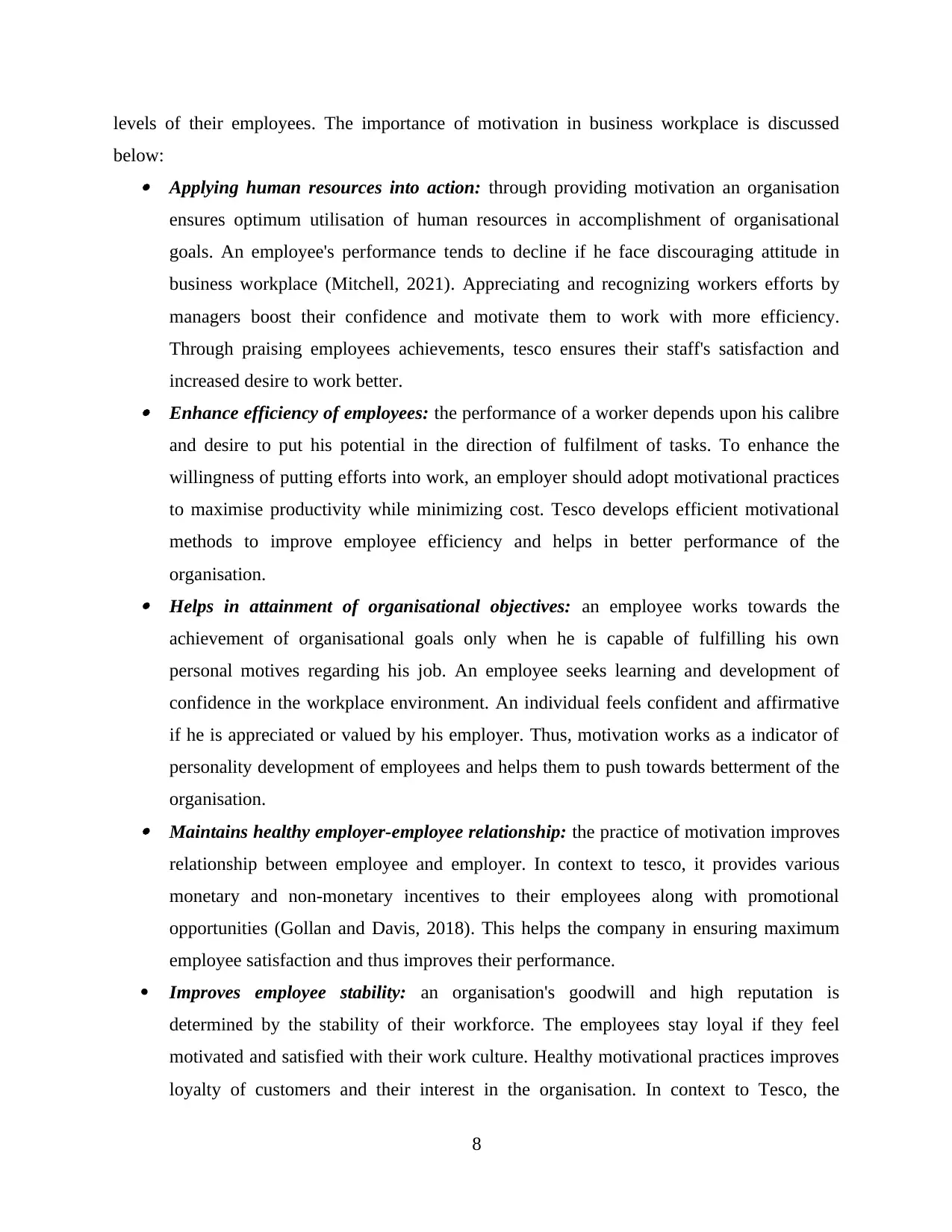
levels of their employees. The importance of motivation in business workplace is discussed
below: Applying human resources into action: through providing motivation an organisation
ensures optimum utilisation of human resources in accomplishment of organisational
goals. An employee's performance tends to decline if he face discouraging attitude in
business workplace (Mitchell, 2021). Appreciating and recognizing workers efforts by
managers boost their confidence and motivate them to work with more efficiency.
Through praising employees achievements, tesco ensures their staff's satisfaction and
increased desire to work better. Enhance efficiency of employees: the performance of a worker depends upon his calibre
and desire to put his potential in the direction of fulfilment of tasks. To enhance the
willingness of putting efforts into work, an employer should adopt motivational practices
to maximise productivity while minimizing cost. Tesco develops efficient motivational
methods to improve employee efficiency and helps in better performance of the
organisation. Helps in attainment of organisational objectives: an employee works towards the
achievement of organisational goals only when he is capable of fulfilling his own
personal motives regarding his job. An employee seeks learning and development of
confidence in the workplace environment. An individual feels confident and affirmative
if he is appreciated or valued by his employer. Thus, motivation works as a indicator of
personality development of employees and helps them to push towards betterment of the
organisation. Maintains healthy employer-employee relationship: the practice of motivation improves
relationship between employee and employer. In context to tesco, it provides various
monetary and non-monetary incentives to their employees along with promotional
opportunities (Gollan and Davis, 2018). This helps the company in ensuring maximum
employee satisfaction and thus improves their performance.
Improves employee stability: an organisation's goodwill and high reputation is
determined by the stability of their workforce. The employees stay loyal if they feel
motivated and satisfied with their work culture. Healthy motivational practices improves
loyalty of customers and their interest in the organisation. In context to Tesco, the
8
below: Applying human resources into action: through providing motivation an organisation
ensures optimum utilisation of human resources in accomplishment of organisational
goals. An employee's performance tends to decline if he face discouraging attitude in
business workplace (Mitchell, 2021). Appreciating and recognizing workers efforts by
managers boost their confidence and motivate them to work with more efficiency.
Through praising employees achievements, tesco ensures their staff's satisfaction and
increased desire to work better. Enhance efficiency of employees: the performance of a worker depends upon his calibre
and desire to put his potential in the direction of fulfilment of tasks. To enhance the
willingness of putting efforts into work, an employer should adopt motivational practices
to maximise productivity while minimizing cost. Tesco develops efficient motivational
methods to improve employee efficiency and helps in better performance of the
organisation. Helps in attainment of organisational objectives: an employee works towards the
achievement of organisational goals only when he is capable of fulfilling his own
personal motives regarding his job. An employee seeks learning and development of
confidence in the workplace environment. An individual feels confident and affirmative
if he is appreciated or valued by his employer. Thus, motivation works as a indicator of
personality development of employees and helps them to push towards betterment of the
organisation. Maintains healthy employer-employee relationship: the practice of motivation improves
relationship between employee and employer. In context to tesco, it provides various
monetary and non-monetary incentives to their employees along with promotional
opportunities (Gollan and Davis, 2018). This helps the company in ensuring maximum
employee satisfaction and thus improves their performance.
Improves employee stability: an organisation's goodwill and high reputation is
determined by the stability of their workforce. The employees stay loyal if they feel
motivated and satisfied with their work culture. Healthy motivational practices improves
loyalty of customers and their interest in the organisation. In context to Tesco, the
8
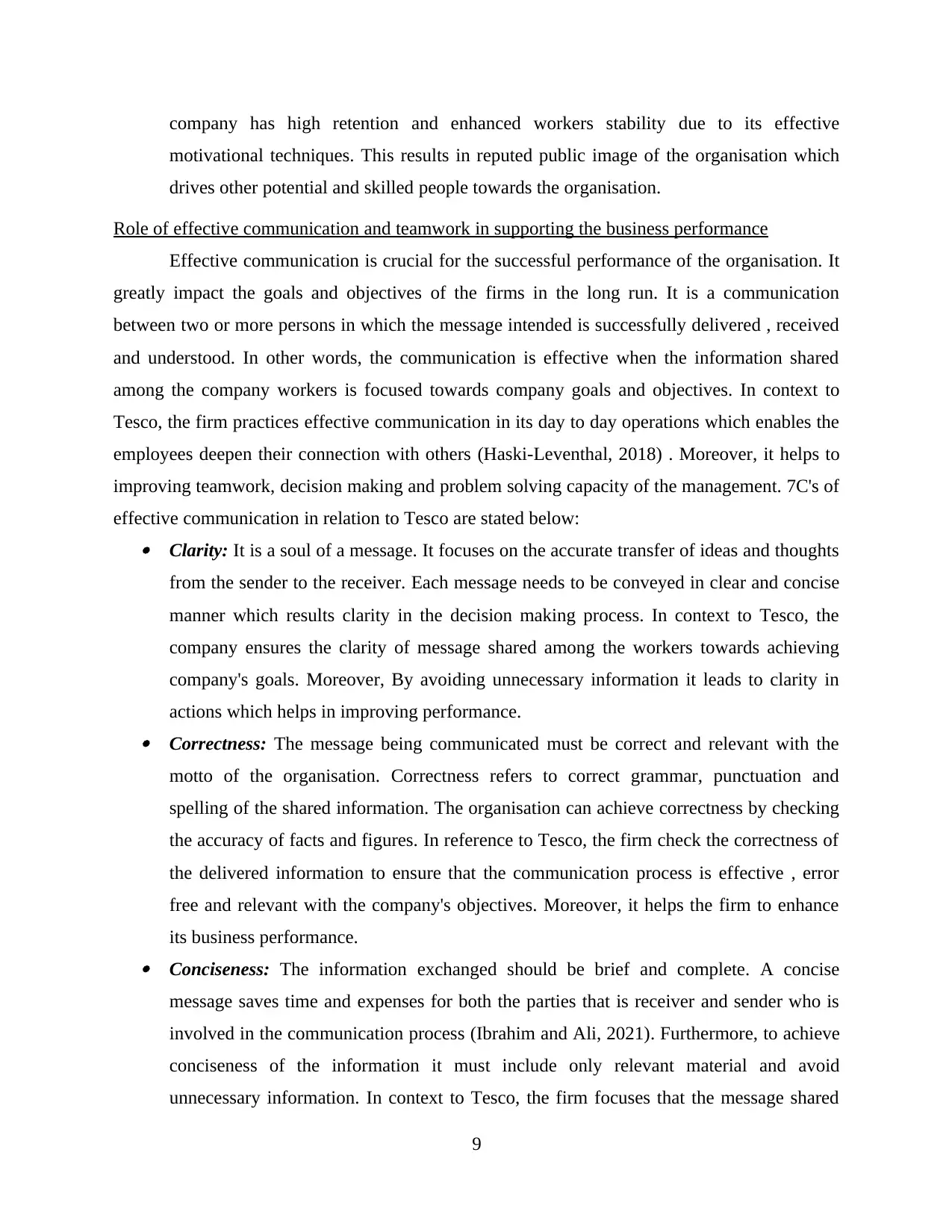
company has high retention and enhanced workers stability due to its effective
motivational techniques. This results in reputed public image of the organisation which
drives other potential and skilled people towards the organisation.
Role of effective communication and teamwork in supporting the business performance
Effective communication is crucial for the successful performance of the organisation. It
greatly impact the goals and objectives of the firms in the long run. It is a communication
between two or more persons in which the message intended is successfully delivered , received
and understood. In other words, the communication is effective when the information shared
among the company workers is focused towards company goals and objectives. In context to
Tesco, the firm practices effective communication in its day to day operations which enables the
employees deepen their connection with others (Haski-Leventhal, 2018) . Moreover, it helps to
improving teamwork, decision making and problem solving capacity of the management. 7C's of
effective communication in relation to Tesco are stated below: Clarity: It is a soul of a message. It focuses on the accurate transfer of ideas and thoughts
from the sender to the receiver. Each message needs to be conveyed in clear and concise
manner which results clarity in the decision making process. In context to Tesco, the
company ensures the clarity of message shared among the workers towards achieving
company's goals. Moreover, By avoiding unnecessary information it leads to clarity in
actions which helps in improving performance. Correctness: The message being communicated must be correct and relevant with the
motto of the organisation. Correctness refers to correct grammar, punctuation and
spelling of the shared information. The organisation can achieve correctness by checking
the accuracy of facts and figures. In reference to Tesco, the firm check the correctness of
the delivered information to ensure that the communication process is effective , error
free and relevant with the company's objectives. Moreover, it helps the firm to enhance
its business performance. Conciseness: The information exchanged should be brief and complete. A concise
message saves time and expenses for both the parties that is receiver and sender who is
involved in the communication process (Ibrahim and Ali, 2021). Furthermore, to achieve
conciseness of the information it must include only relevant material and avoid
unnecessary information. In context to Tesco, the firm focuses that the message shared
9
motivational techniques. This results in reputed public image of the organisation which
drives other potential and skilled people towards the organisation.
Role of effective communication and teamwork in supporting the business performance
Effective communication is crucial for the successful performance of the organisation. It
greatly impact the goals and objectives of the firms in the long run. It is a communication
between two or more persons in which the message intended is successfully delivered , received
and understood. In other words, the communication is effective when the information shared
among the company workers is focused towards company goals and objectives. In context to
Tesco, the firm practices effective communication in its day to day operations which enables the
employees deepen their connection with others (Haski-Leventhal, 2018) . Moreover, it helps to
improving teamwork, decision making and problem solving capacity of the management. 7C's of
effective communication in relation to Tesco are stated below: Clarity: It is a soul of a message. It focuses on the accurate transfer of ideas and thoughts
from the sender to the receiver. Each message needs to be conveyed in clear and concise
manner which results clarity in the decision making process. In context to Tesco, the
company ensures the clarity of message shared among the workers towards achieving
company's goals. Moreover, By avoiding unnecessary information it leads to clarity in
actions which helps in improving performance. Correctness: The message being communicated must be correct and relevant with the
motto of the organisation. Correctness refers to correct grammar, punctuation and
spelling of the shared information. The organisation can achieve correctness by checking
the accuracy of facts and figures. In reference to Tesco, the firm check the correctness of
the delivered information to ensure that the communication process is effective , error
free and relevant with the company's objectives. Moreover, it helps the firm to enhance
its business performance. Conciseness: The information exchanged should be brief and complete. A concise
message saves time and expenses for both the parties that is receiver and sender who is
involved in the communication process (Ibrahim and Ali, 2021). Furthermore, to achieve
conciseness of the information it must include only relevant material and avoid
unnecessary information. In context to Tesco, the firm focuses that the message shared
9
⊘ This is a preview!⊘
Do you want full access?
Subscribe today to unlock all pages.

Trusted by 1+ million students worldwide
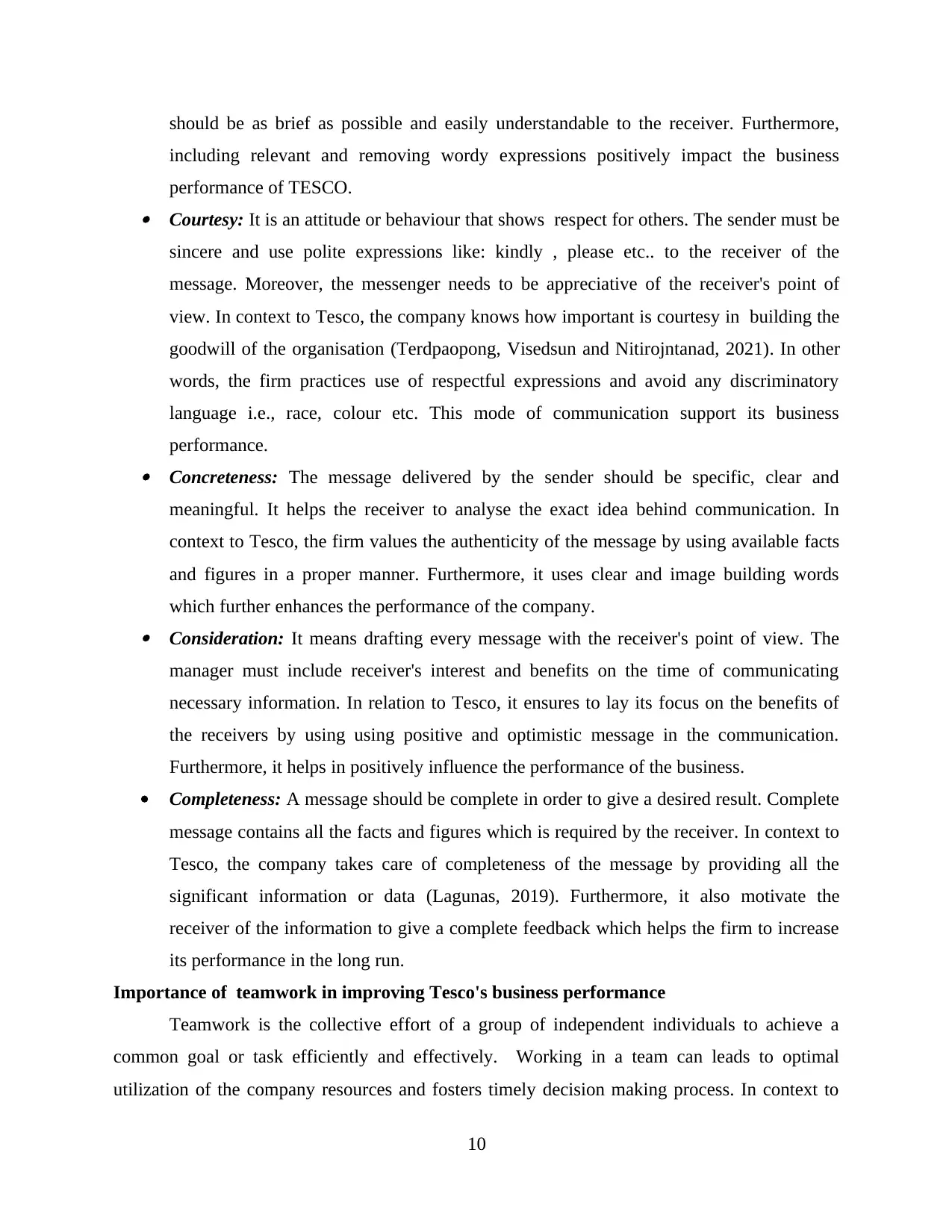
should be as brief as possible and easily understandable to the receiver. Furthermore,
including relevant and removing wordy expressions positively impact the business
performance of TESCO. Courtesy: It is an attitude or behaviour that shows respect for others. The sender must be
sincere and use polite expressions like: kindly , please etc.. to the receiver of the
message. Moreover, the messenger needs to be appreciative of the receiver's point of
view. In context to Tesco, the company knows how important is courtesy in building the
goodwill of the organisation (Terdpaopong, Visedsun and Nitirojntanad, 2021). In other
words, the firm practices use of respectful expressions and avoid any discriminatory
language i.e., race, colour etc. This mode of communication support its business
performance. Concreteness: The message delivered by the sender should be specific, clear and
meaningful. It helps the receiver to analyse the exact idea behind communication. In
context to Tesco, the firm values the authenticity of the message by using available facts
and figures in a proper manner. Furthermore, it uses clear and image building words
which further enhances the performance of the company. Consideration: It means drafting every message with the receiver's point of view. The
manager must include receiver's interest and benefits on the time of communicating
necessary information. In relation to Tesco, it ensures to lay its focus on the benefits of
the receivers by using using positive and optimistic message in the communication.
Furthermore, it helps in positively influence the performance of the business.
Completeness: A message should be complete in order to give a desired result. Complete
message contains all the facts and figures which is required by the receiver. In context to
Tesco, the company takes care of completeness of the message by providing all the
significant information or data (Lagunas, 2019). Furthermore, it also motivate the
receiver of the information to give a complete feedback which helps the firm to increase
its performance in the long run.
Importance of teamwork in improving Tesco's business performance
Teamwork is the collective effort of a group of independent individuals to achieve a
common goal or task efficiently and effectively. Working in a team can leads to optimal
utilization of the company resources and fosters timely decision making process. In context to
10
including relevant and removing wordy expressions positively impact the business
performance of TESCO. Courtesy: It is an attitude or behaviour that shows respect for others. The sender must be
sincere and use polite expressions like: kindly , please etc.. to the receiver of the
message. Moreover, the messenger needs to be appreciative of the receiver's point of
view. In context to Tesco, the company knows how important is courtesy in building the
goodwill of the organisation (Terdpaopong, Visedsun and Nitirojntanad, 2021). In other
words, the firm practices use of respectful expressions and avoid any discriminatory
language i.e., race, colour etc. This mode of communication support its business
performance. Concreteness: The message delivered by the sender should be specific, clear and
meaningful. It helps the receiver to analyse the exact idea behind communication. In
context to Tesco, the firm values the authenticity of the message by using available facts
and figures in a proper manner. Furthermore, it uses clear and image building words
which further enhances the performance of the company. Consideration: It means drafting every message with the receiver's point of view. The
manager must include receiver's interest and benefits on the time of communicating
necessary information. In relation to Tesco, it ensures to lay its focus on the benefits of
the receivers by using using positive and optimistic message in the communication.
Furthermore, it helps in positively influence the performance of the business.
Completeness: A message should be complete in order to give a desired result. Complete
message contains all the facts and figures which is required by the receiver. In context to
Tesco, the company takes care of completeness of the message by providing all the
significant information or data (Lagunas, 2019). Furthermore, it also motivate the
receiver of the information to give a complete feedback which helps the firm to increase
its performance in the long run.
Importance of teamwork in improving Tesco's business performance
Teamwork is the collective effort of a group of independent individuals to achieve a
common goal or task efficiently and effectively. Working in a team can leads to optimal
utilization of the company resources and fosters timely decision making process. In context to
10
Paraphrase This Document
Need a fresh take? Get an instant paraphrase of this document with our AI Paraphraser
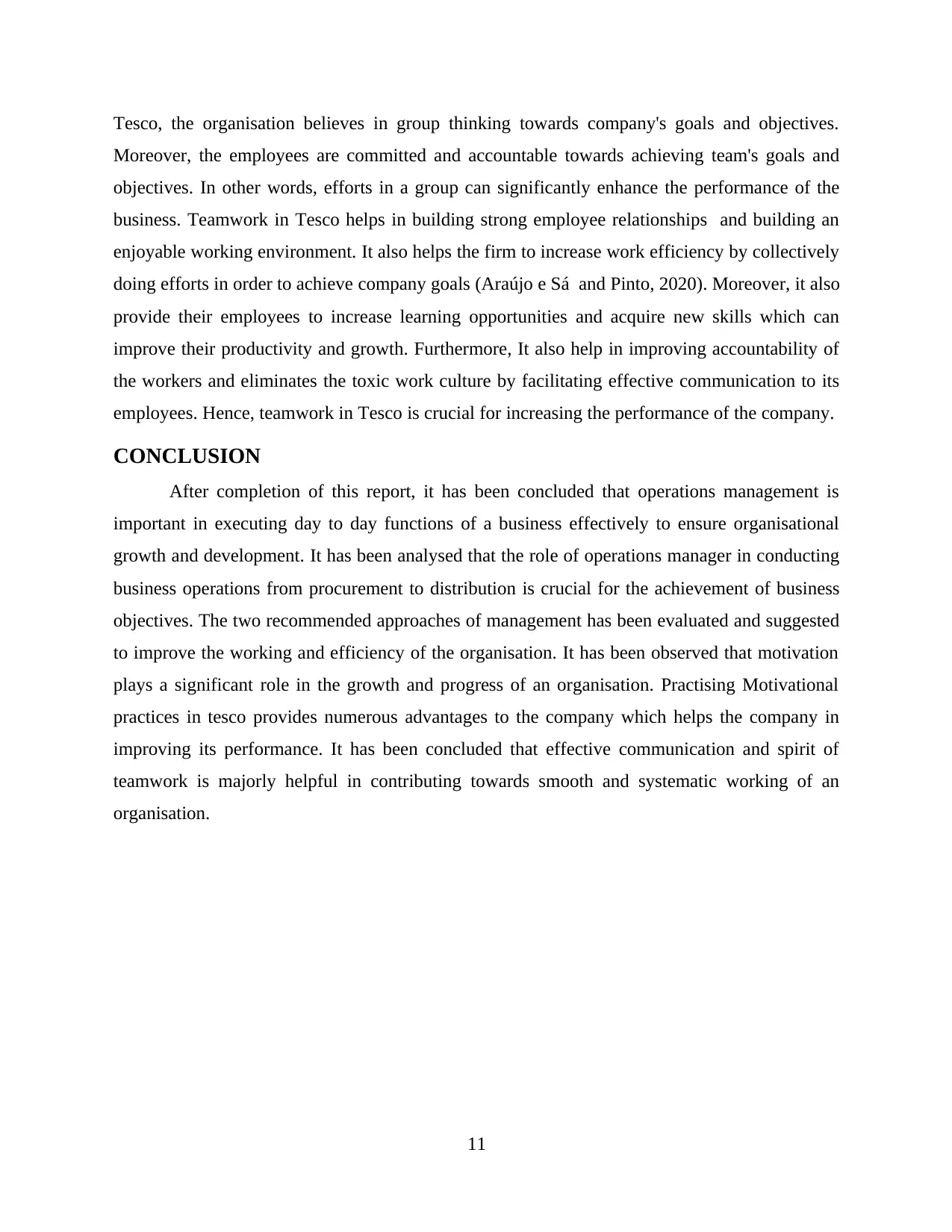
Tesco, the organisation believes in group thinking towards company's goals and objectives.
Moreover, the employees are committed and accountable towards achieving team's goals and
objectives. In other words, efforts in a group can significantly enhance the performance of the
business. Teamwork in Tesco helps in building strong employee relationships and building an
enjoyable working environment. It also helps the firm to increase work efficiency by collectively
doing efforts in order to achieve company goals (Araújo e Sá and Pinto, 2020). Moreover, it also
provide their employees to increase learning opportunities and acquire new skills which can
improve their productivity and growth. Furthermore, It also help in improving accountability of
the workers and eliminates the toxic work culture by facilitating effective communication to its
employees. Hence, teamwork in Tesco is crucial for increasing the performance of the company.
CONCLUSION
After completion of this report, it has been concluded that operations management is
important in executing day to day functions of a business effectively to ensure organisational
growth and development. It has been analysed that the role of operations manager in conducting
business operations from procurement to distribution is crucial for the achievement of business
objectives. The two recommended approaches of management has been evaluated and suggested
to improve the working and efficiency of the organisation. It has been observed that motivation
plays a significant role in the growth and progress of an organisation. Practising Motivational
practices in tesco provides numerous advantages to the company which helps the company in
improving its performance. It has been concluded that effective communication and spirit of
teamwork is majorly helpful in contributing towards smooth and systematic working of an
organisation.
11
Moreover, the employees are committed and accountable towards achieving team's goals and
objectives. In other words, efforts in a group can significantly enhance the performance of the
business. Teamwork in Tesco helps in building strong employee relationships and building an
enjoyable working environment. It also helps the firm to increase work efficiency by collectively
doing efforts in order to achieve company goals (Araújo e Sá and Pinto, 2020). Moreover, it also
provide their employees to increase learning opportunities and acquire new skills which can
improve their productivity and growth. Furthermore, It also help in improving accountability of
the workers and eliminates the toxic work culture by facilitating effective communication to its
employees. Hence, teamwork in Tesco is crucial for increasing the performance of the company.
CONCLUSION
After completion of this report, it has been concluded that operations management is
important in executing day to day functions of a business effectively to ensure organisational
growth and development. It has been analysed that the role of operations manager in conducting
business operations from procurement to distribution is crucial for the achievement of business
objectives. The two recommended approaches of management has been evaluated and suggested
to improve the working and efficiency of the organisation. It has been observed that motivation
plays a significant role in the growth and progress of an organisation. Practising Motivational
practices in tesco provides numerous advantages to the company which helps the company in
improving its performance. It has been concluded that effective communication and spirit of
teamwork is majorly helpful in contributing towards smooth and systematic working of an
organisation.
11
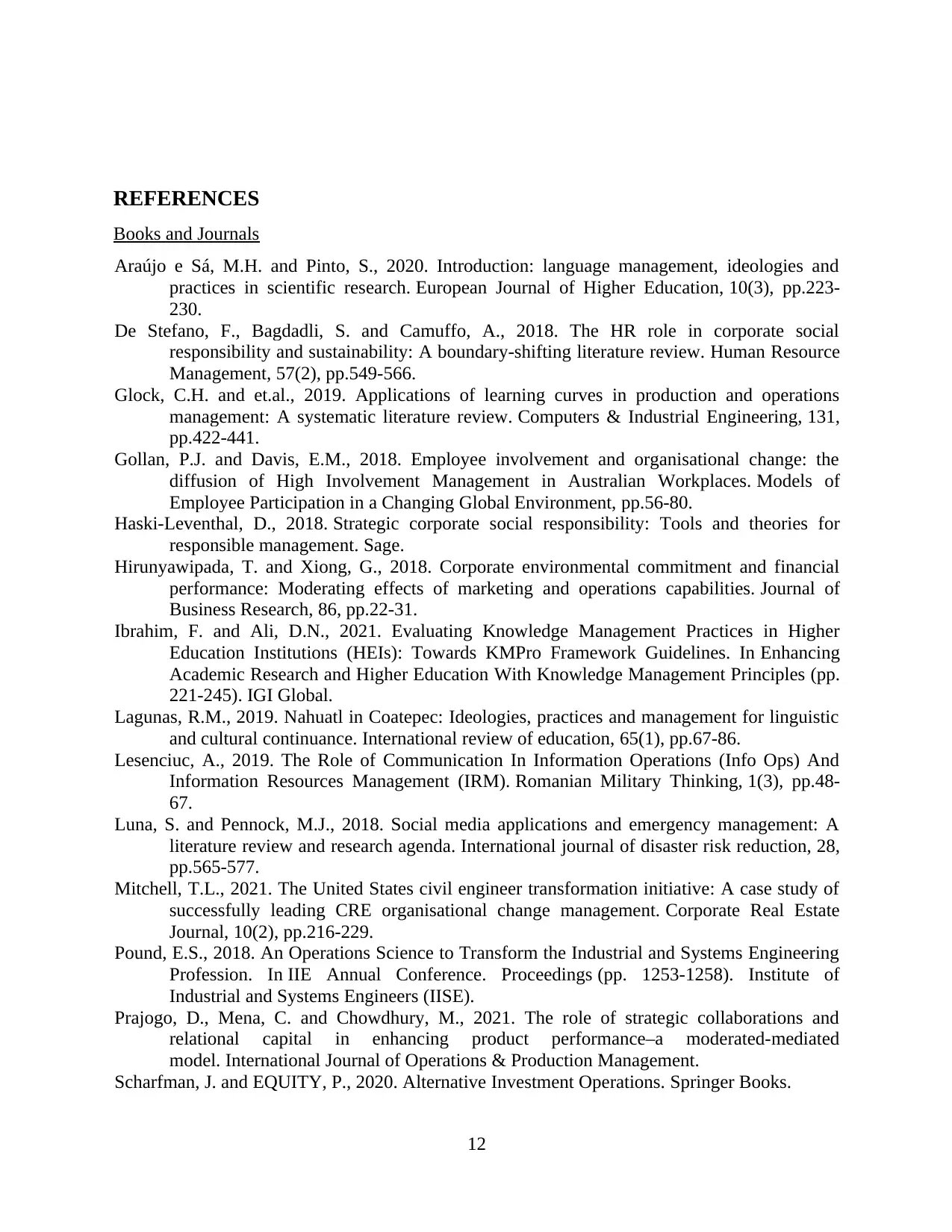
REFERENCES
Books and Journals
Araújo e Sá, M.H. and Pinto, S., 2020. Introduction: language management, ideologies and
practices in scientific research. European Journal of Higher Education, 10(3), pp.223-
230.
De Stefano, F., Bagdadli, S. and Camuffo, A., 2018. The HR role in corporate social
responsibility and sustainability: A boundary‐shifting literature review. Human Resource
Management, 57(2), pp.549-566.
Glock, C.H. and et.al., 2019. Applications of learning curves in production and operations
management: A systematic literature review. Computers & Industrial Engineering, 131,
pp.422-441.
Gollan, P.J. and Davis, E.M., 2018. Employee involvement and organisational change: the
diffusion of High Involvement Management in Australian Workplaces. Models of
Employee Participation in a Changing Global Environment, pp.56-80.
Haski-Leventhal, D., 2018. Strategic corporate social responsibility: Tools and theories for
responsible management. Sage.
Hirunyawipada, T. and Xiong, G., 2018. Corporate environmental commitment and financial
performance: Moderating effects of marketing and operations capabilities. Journal of
Business Research, 86, pp.22-31.
Ibrahim, F. and Ali, D.N., 2021. Evaluating Knowledge Management Practices in Higher
Education Institutions (HEIs): Towards KMPro Framework Guidelines. In Enhancing
Academic Research and Higher Education With Knowledge Management Principles (pp.
221-245). IGI Global.
Lagunas, R.M., 2019. Nahuatl in Coatepec: Ideologies, practices and management for linguistic
and cultural continuance. International review of education, 65(1), pp.67-86.
Lesenciuc, A., 2019. The Role of Communication In Information Operations (Info Ops) And
Information Resources Management (IRM). Romanian Military Thinking, 1(3), pp.48-
67.
Luna, S. and Pennock, M.J., 2018. Social media applications and emergency management: A
literature review and research agenda. International journal of disaster risk reduction, 28,
pp.565-577.
Mitchell, T.L., 2021. The United States civil engineer transformation initiative: A case study of
successfully leading CRE organisational change management. Corporate Real Estate
Journal, 10(2), pp.216-229.
Pound, E.S., 2018. An Operations Science to Transform the Industrial and Systems Engineering
Profession. In IIE Annual Conference. Proceedings (pp. 1253-1258). Institute of
Industrial and Systems Engineers (IISE).
Prajogo, D., Mena, C. and Chowdhury, M., 2021. The role of strategic collaborations and
relational capital in enhancing product performance–a moderated-mediated
model. International Journal of Operations & Production Management.
Scharfman, J. and EQUITY, P., 2020. Alternative Investment Operations. Springer Books.
12
Books and Journals
Araújo e Sá, M.H. and Pinto, S., 2020. Introduction: language management, ideologies and
practices in scientific research. European Journal of Higher Education, 10(3), pp.223-
230.
De Stefano, F., Bagdadli, S. and Camuffo, A., 2018. The HR role in corporate social
responsibility and sustainability: A boundary‐shifting literature review. Human Resource
Management, 57(2), pp.549-566.
Glock, C.H. and et.al., 2019. Applications of learning curves in production and operations
management: A systematic literature review. Computers & Industrial Engineering, 131,
pp.422-441.
Gollan, P.J. and Davis, E.M., 2018. Employee involvement and organisational change: the
diffusion of High Involvement Management in Australian Workplaces. Models of
Employee Participation in a Changing Global Environment, pp.56-80.
Haski-Leventhal, D., 2018. Strategic corporate social responsibility: Tools and theories for
responsible management. Sage.
Hirunyawipada, T. and Xiong, G., 2018. Corporate environmental commitment and financial
performance: Moderating effects of marketing and operations capabilities. Journal of
Business Research, 86, pp.22-31.
Ibrahim, F. and Ali, D.N., 2021. Evaluating Knowledge Management Practices in Higher
Education Institutions (HEIs): Towards KMPro Framework Guidelines. In Enhancing
Academic Research and Higher Education With Knowledge Management Principles (pp.
221-245). IGI Global.
Lagunas, R.M., 2019. Nahuatl in Coatepec: Ideologies, practices and management for linguistic
and cultural continuance. International review of education, 65(1), pp.67-86.
Lesenciuc, A., 2019. The Role of Communication In Information Operations (Info Ops) And
Information Resources Management (IRM). Romanian Military Thinking, 1(3), pp.48-
67.
Luna, S. and Pennock, M.J., 2018. Social media applications and emergency management: A
literature review and research agenda. International journal of disaster risk reduction, 28,
pp.565-577.
Mitchell, T.L., 2021. The United States civil engineer transformation initiative: A case study of
successfully leading CRE organisational change management. Corporate Real Estate
Journal, 10(2), pp.216-229.
Pound, E.S., 2018. An Operations Science to Transform the Industrial and Systems Engineering
Profession. In IIE Annual Conference. Proceedings (pp. 1253-1258). Institute of
Industrial and Systems Engineers (IISE).
Prajogo, D., Mena, C. and Chowdhury, M., 2021. The role of strategic collaborations and
relational capital in enhancing product performance–a moderated-mediated
model. International Journal of Operations & Production Management.
Scharfman, J. and EQUITY, P., 2020. Alternative Investment Operations. Springer Books.
12
⊘ This is a preview!⊘
Do you want full access?
Subscribe today to unlock all pages.

Trusted by 1+ million students worldwide
1 out of 13
Related Documents
Your All-in-One AI-Powered Toolkit for Academic Success.
+13062052269
info@desklib.com
Available 24*7 on WhatsApp / Email
![[object Object]](/_next/static/media/star-bottom.7253800d.svg)
Unlock your academic potential
Copyright © 2020–2026 A2Z Services. All Rights Reserved. Developed and managed by ZUCOL.





